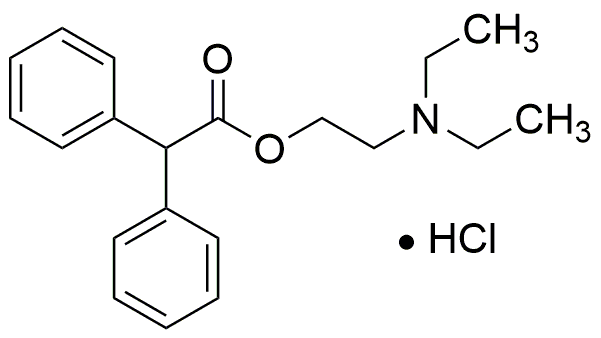Adiphenine hydrochloride is widely utilized in research focused on:
- Pharmaceutical Development: This compound is often used in the formulation of medications aimed at treating various conditions, including muscle spasms and pain relief, due to its muscle relaxant properties.
- Neurological Research: Researchers study adiphenine hydrochloride to understand its effects on the central nervous system, making it valuable in developing treatments for neurological disorders.
- Analytical Chemistry: It serves as a standard reference in analytical methods, helping to ensure accuracy and reliability in the quantification of similar compounds in various samples.
- Veterinary Medicine: The compound is also applied in veterinary practices for its muscle relaxant effects, assisting in procedures that require sedation in animals.
- Clinical Trials: Adiphenine hydrochloride is frequently involved in clinical trials aimed at evaluating new therapeutic strategies, providing insights into its efficacy and safety in human subjects.
General Information
Properties
Safety and Regulations
Applications
Adiphenine hydrochloride is widely utilized in research focused on:
- Pharmaceutical Development: This compound is often used in the formulation of medications aimed at treating various conditions, including muscle spasms and pain relief, due to its muscle relaxant properties.
- Neurological Research: Researchers study adiphenine hydrochloride to understand its effects on the central nervous system, making it valuable in developing treatments for neurological disorders.
- Analytical Chemistry: It serves as a standard reference in analytical methods, helping to ensure accuracy and reliability in the quantification of similar compounds in various samples.
- Veterinary Medicine: The compound is also applied in veterinary practices for its muscle relaxant effects, assisting in procedures that require sedation in animals.
- Clinical Trials: Adiphenine hydrochloride is frequently involved in clinical trials aimed at evaluating new therapeutic strategies, providing insights into its efficacy and safety in human subjects.
Documents
Safety Data Sheets (SDS)
The SDS provides comprehensive safety information on handling, storage, and disposal of the product.
Product Specification (PS)
The PS provides a comprehensive breakdown of the product’s properties, including chemical composition, physical state, purity, and storage requirements. It also details acceptable quality ranges and the product's intended applications.
Certificates of Analysis (COA)
Search for Certificates of Analysis (COA) by entering the products Lot Number. Lot and Batch Numbers can be found on a product’s label following the words ‘Lot’ or ‘Batch’.
*Catalog Number
*Lot Number
Certificates Of Origin (COO)
This COO confirms the country where the product was manufactured, and also details the materials and components used in it and whether it is derived from natural, synthetic, or other specific sources. This certificate may be required for customs, trade, and regulatory compliance.
*Catalog Number
*Lot Number
Safety Data Sheets (SDS)
The SDS provides comprehensive safety information on handling, storage, and disposal of the product.
DownloadProduct Specification (PS)
The PS provides a comprehensive breakdown of the product’s properties, including chemical composition, physical state, purity, and storage requirements. It also details acceptable quality ranges and the product's intended applications.
DownloadCertificates of Analysis (COA)
Search for Certificates of Analysis (COA) by entering the products Lot Number. Lot and Batch Numbers can be found on a product’s label following the words ‘Lot’ or ‘Batch’.
*Catalog Number
*Lot Number
Certificates Of Origin (COO)
This COO confirms the country where the product was manufactured, and also details the materials and components used in it and whether it is derived from natural, synthetic, or other specific sources. This certificate may be required for customs, trade, and regulatory compliance.


